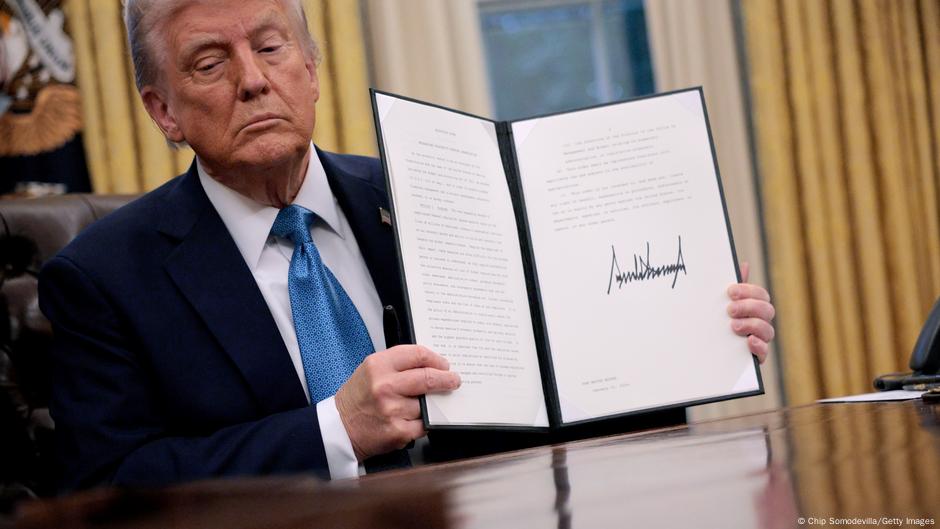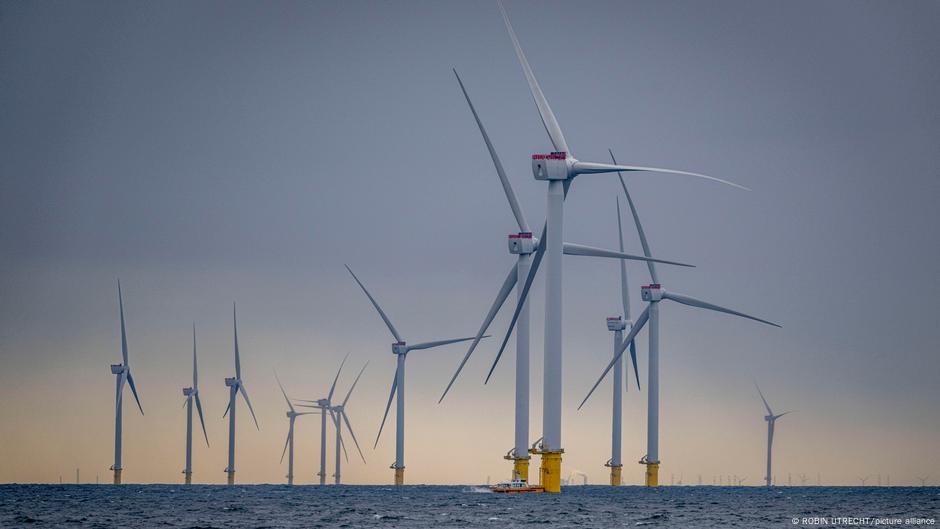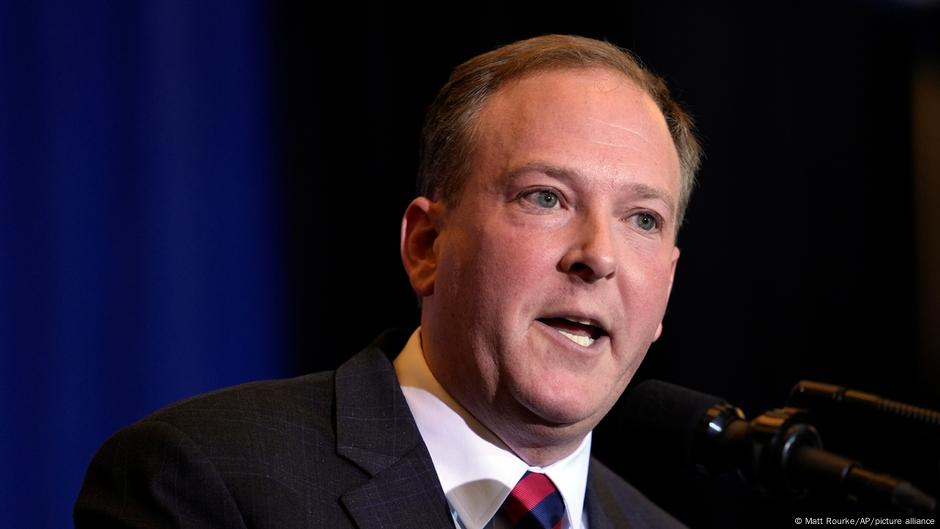As the newly appointed EPA chief, Lee Zeldin pledges to deal a severe blow to climate and clean energy programs, leading taxpayers to bear the cost of harsh weather events and the erosion of a rapidly growing green sector.

On his return to the White House on January 20, Donald Trump issued multiple executive orders aimed at reversing various climate policies and promoting clean energy initiatives.
An executive order labeled a "national energy emergency." A separate directive, named "unleashing American energy," criticized "onerous and politically driven regulations" for constraining "dependable and budget-friendly electricity," which predominantly comes from oil, natural gas, and coal sources.
As promised, Trump also targeted wind energy with an order that briefly halts all offshore permits and federal leasing activities.
In the United States, which ranks as the globe’s second-largest producer of greenhouse gases, oil and natural gas extraction hit its peak during President Joe Biden's tenure. Additionally, data from the U.S. Energy Information Administration indicates that average electricity costs decreased and became less volatile in 2024 compared to the preceding year for residents across almost every state in the country.

This wasn't solely attributed to inexpensive natural gas prices; rather, it was largely due to lower-cost renewable energy sources being added to the power grid along with increased battery storage capabilities—partly because of declining expenses associated with renewable technologies.
Trump's directive also criticized policies aimed at transitioning to green energy for constraining "employment opportunities," even though the U.S. renewable energy sector provides approximately triple the number of jobs compared to the conventional fossil fuel industry.
The job growth in the clean energy sector increased at over double the pace of the robust general U.S. employment market in 2023.
In the previous year, renewables such as solar panels, wind turbines, and hydropower and geothermal energy systems had already accounted for more than 84% of the newly created employment opportunities in the power sector.
'A spear through the core of climate-change dogma'
This month, the newly appointed leader of the Environmental Protection Agency, Lee Zeldin , declared 31 reversals concerning regulations and funding for climate and environmental protections, as well as clean energy initiatives.
Zeldin stated in a social media post on X that we are fulfilling our commitments to unlock American energy, reduce expenses for citizens, and rejuvenate the American automotive sector.
Furthermore, he declared an end to approximately $20 billion (€18.3 billion) in clean energy and climate-related grants provided by the previous Biden administration through the Greenhouse Gas Reduction Fund, often referred to as the "green bank."
Zeldin pointed out "systematic fraud, wastage, and misuse" during his confirmation. cuts to the Green Bank; however, a district court judge subsequently stated that the administration had not presented any "proof of misconduct" related to the financing.

Public funds will cover huge climate-related losses.
When Donald Trump pulled the U.S. out of the Paris Climate Accord For the second time earlier this year, he raised concerns that the nation's inability to decrease emissions might significantly impede the attempts to restrict global warming.
This could lead to significant financial burdens for people both within the United States and globally. According to a report from business consultants at the Boston Consulting Group, should temperatures rise by 3 degrees Celsius by 2100—twice the 1.5-degree objective established in Paris—it forecasts that this level of warming will decrease total economic output by between 15% and 34% by the century’s close.
Over the past ten years, climate-induced severe weather occurrences have resulted in economic losses exceeding $2 trillion worldwide, as stated in a recent study published by the International Chamber of Commerce.
The January Los Angeles wildfires resulting in extensive damage, and they have been associated with anthropogenic climate change , acting alone, resulted in property and capital damage costs totaling approximately $164 billion.
The Boston Consultancy Group has pointed out that failing to act could result in a global economic loss equivalent to up to 27% of total cumulative GDP. This amount would be sufficient to eliminate extreme poverty worldwide instead.
Reversals in climate policies may lead to employment reductions and economic downturn.
Corey Bradshaw, a professor of global ecology at Flinders University in South Australia, asserts that the Trump administration’s claim about improving economic well-being through cuts to environmental policies is incorrect. According to him, discouraging the growth of green manufacturing will lead to job reductions and an overall economic downturn for U.S. consumers.
" Their expenses will increase and their chances of earning an income will decrease," he stated.
Following the 2022 Inflation Reduction Act (IRA), which initiated an influx of several hundred billion dollars into clean energy technologies, over fifty percent of all U.S. private investment growth can be attributed to this sector as reported by the 2024 Clean Investment Monitor (CIM). This organization monitors both public and private financing directed towards climate-related tech within the United States.
The most rapid expansion occurred in the sector of manufacturing clean energy and transportation technologies, amounting to $89 billion over the two years following the enactment of the Inflation Reduction Act. This figure represents more than quadruple the investment of $22 billion made during the preceding two years before the implementation of President Biden’s key 2022 legislation aimed at tackling climate issues.
Republican-led areas have greatly benefited from this clean energy initiative. Almost 60% of the projects announced since 2022 are located within the party's congressional districts.
In 2024, the United States' power grid incorporated more generating capacity from solar energy than from any other resource over the past twenty years.
Sylvia Levy-Martinez, a solar analyst at US-based energy consultancy firm Wood Mackenzie, who was one of the authors of the report highlighting this unprecedented surge in solar adoption, cautioned that this growth spurt might swiftly reverse course nonetheless.
The surge in installation records last year was supported by various solar incentives and tax benefits included in the Inflation Reduction Act, which boosted enthusiasm for the solar sector," she stated. "Should most of these policies be removed or substantially modified, it would severely hamper the industry’s ongoing expansion.
Will Trump's climate rollback face opposition in the courts?
In the meantime, David Bookbinder, who leads law and policy initiatives at the Environmental Integrity Project—a nonprofit advocate for climate action—thinks that attempts to undo climate and environmental safeguards will likely face legal challenges in court.
He stated that the EPA cannot reverse those regulations without going through a long process. He also pointed out that during the initial Trump administration, the EPA mostly lost its climate protection lawsuits because they failed to adhere to proper procedures.
Corey Bradshaw warns, though, that despite Trump's attempts to rollback climate policies being "irrational" and essentially backing "a fading fossil fuel sector," any postponement of essential emissions reductions will swiftly "undermine all progress toward addressing climate change." Edited by: Tamsin Walker
Author: Stuart Braun
